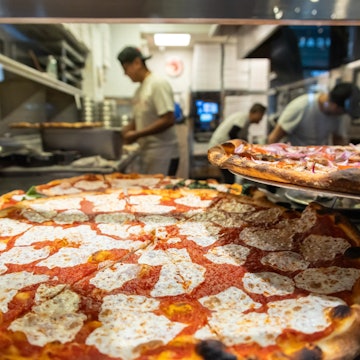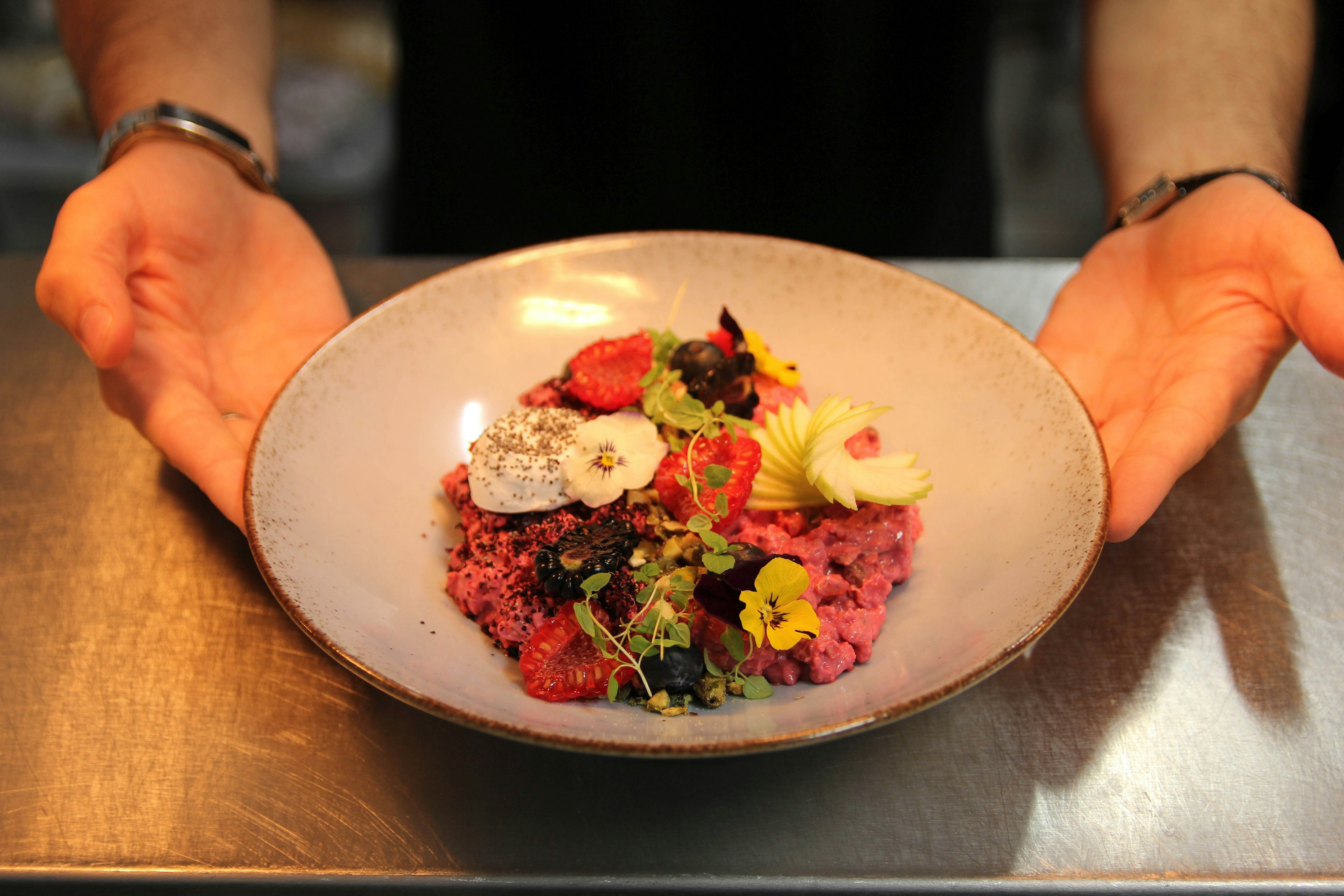

Colourful filled croissants created by the pastry chefs at Supermoon Bakehouse © MaSovaida Morgan / Lonely Planet
Instagram is impacting more than our travel choices; it’s changing the way some chefs are creating dishes. From pink hummus to Ferrero Rocher cruffins (croissant-muffins), the social media app is chock-a-block with brightly-coloured and bombastic creations that wouldn’t look out of place in Willy Wonka's Chocolate Factory. We sent Lonely Planet writers Gavin Haines to London and MaSovaida Morgan to New York City to talk to the chefs transforming their food so that it looks good on your feed.

EL&N, London
"We tried to make a pink egg," says chef Dan Booth, completely deadpan. "But it didn’t look right."
He means that it didn’t look right on Instagram, particularly once the obligatory filters had been added, so it had to go. "Some creations work, others don’t," he shrugs. "Sometimes you have to let an egg be an egg."
Thanks to Instagram, what goes on the dinner plate no longer stays on the dinner plate, but floats around indefinitely online for all to see. Consequently, knocking out decent food is no longer good enough for some chefs; dishes also have to light up customer's social media too.
EL&N, the London cafe chain where Booth is head of food, was made for the 'gram. The social media platform has informed everything about the brand, from the decor to the dishes. "It leans into everything we do," says Booth, who I meet in EL&N’s unapologetically kitsch Lowndes Street branch. He’s grazing on pink bircher, a trendy muesli that’s been tagged 51,000 times on Instagram.

The importance of colour
Almost everything in the cafe is pink: the tables, the chairs, the faux flowers festooning the walls and, yes, the bircher. "Beetroot juice," explains Booth, anticipating my next question about the flushed muesli. You’d get the same hue with food colouring, he explains, but that wouldn’t do. "There has to be substance as well as style," he says. "Dishes also need to have the health benefits that are going to attract our target audience."
That audience is 18 to 35-year-olds, mostly women: a demographic that seems strangely absent when I first walk in, but they soon appear, phones in hand, ready to post. And post they do: EL&N has 373k snap-happy followers on Instagram, nearly as many as nearby Fulham FC.
Pretty food is nothing new, of course. It’s been a stock-in-trade for top restaurants for decades. But now, claims Booth, it’s gone mainstream thanks to social media, which directly influences what goes on his menus. "When I’m developing dishes, we will take a photo of it, chuck some filters on to see how it will look on Instagram," he says, adding that unattractive creations go the way of the pink egg.
Surprisingly, likes aren’t that important to Booth when he’s reviewing how his dishes perform on Instagram; it’s the comments he pays close attention to. This allows him to identify recurring themes; things diners enjoyed or didn’t. Any critical feedback recently? "Someone said the pink buns weren’t pink enough."
So, what makes a successful Instagram dish? "Straight lines and round edges work well," says Booth, who’s made stencils to help chefs lay out dishes. "You can’t get those clean lines otherwise," he adds.
Colour is vital, too. You need lots of it, but the hues must complement and contrast, not clash. EL&N’s most 'grammed dish – smashed avo with pink hummus, a poached egg and edible pansies – is a prime example, says Booth, praising its contrasting colours.
Dan digs a spoon into his pink bircher. I ask if he ever finds himself taking photos of meals when he’s eating out. "No," he says, between mouthfuls, "I just chow down."

Sketch, London
Some restaurants even create dishes to go with the decor. One such establishment is Sketch (Instagram followers: 328k), in nearby Mayfair, where afternoon tea has been designed to complement the all-pink Gallery room in which it is served.
"It is an elegant and feminine room, so our afternoon tea has to have an elegant colour," explains head chef, Frederic Don, in his chef’s whites. "We would not go with something dark and heavy – it wouldn’t work."

Supermoon Bakehouse, New York City
For purveyors of 'foodstagram' favourites, ingredient availability often determines what gets featured on the menu. But Aron Tzimas, co-owner of Supermoon Bakehouse in New York City, says it’s not just seasonality that inspires chef Ry Stephen’s creations – nostalgia and travel are equally integral.
"We love to look back on things we grew up with that make us smile and interpret them in a modern way," he enthuses, and it’s creations like a Ferrero Rocher cruffin and sweetcorn soft-serve that lure visitors to the Lower East Side store.
Snapping for the ‘gram commences the moment people walk through the Supermoon door. The pink terrazzo counter – upon which the bakery’s most Insta-worthy delicacies are displayed – matches the table tops, while a pop of flamingo-hued neon lighting stands out in sumptuous contrast against muted concrete walls.
Stacked behind the counter are silver space-age holographic boxes, which customers proudly depart with upon purchasing half a dozen treats. Past the glass partition, bakers are hard at work in a white-tiled kitchen, where technicolour pastries are engineered with French-imported butter before being filled and festooned with a melange of decadent ingredients.

Social media input
Stephen and Tzimas, both from Melbourne, Australia, often think back to their most beloved travel destinations when brainstorming and executing a new creation, instilling a sense of place in their treats like the black sesame miso rice pudding. But they have drawn inspiration from their current home town as well.
"We look at the city we’re in and find the treasures that are ingrained in its rich history," says Tzimas. That hunt for local influences has led to creations like the cream cheese and lox-laden New York croissant and the Reuben twice-baked croissant.
Instagram is the only social media platform that Supermoon Bakehouse uses for promotion and it’s where almost 177k global followers stay informed about everything from today-only deals to monthly flavour specials. But Tzimas reveals that the number of likes don’t drive business beyond what might make for a better photo. "People speak with their stomachs and wallets, so we get a lot of good data from the bakehouse itself," he admits.
That’s not to say that Instagram doesn’t have an impact. The team intermittently use the app’s story feature for polls and followers have been asked previously about what flavours and ideas they want to see in the bakery’s products, hence how the peanut butter and jelly twice-baked croissant arrived on the scene. "That's invaluable as we have a direct line with our customers," says Tzimas. "We love talking to people who follow us as they give us great feedback and always say the loveliest, most supportive things that push us to keep going and do more."

Recipe refinement
When it comes to recipe development, innovation is ongoing. There’s no defined system, but rather an organic process of experimentation. "There’s no huge build-up or testing phase. We sort of create things on a daily basis, put it on the bench and see if people like it, and then iterate on it," says Tzimas. The flavours don’t have to be unusual to go through this process either – the bakery recently released the sixth version of its salted caramel doughnut.
Since opening in 2017, Supermoon has launched over 100 different treats, including multi-coloured croissants, coconut-cream doughnuts, mango curry-flavoured ice creams and limited-edition holiday pies. The menu changes weekly, but the top-selling banana split sundae twice-baked croissant is the only creation that has been available consistently.
But even social media success and a handful of die-hard fans can’t save some flavour profiles, especially when the team is really pushing the envelope. Neither the tomato, basil and balsamic soft-serve nor the sweet cheese, mandarin and black pepper croissant sold well enough to still be available; but both looked great on Instagram.
You may also like:
Under the influence: owners on unwanted Instagram success
Step up your Instagram game with these 10 travel photography tips















